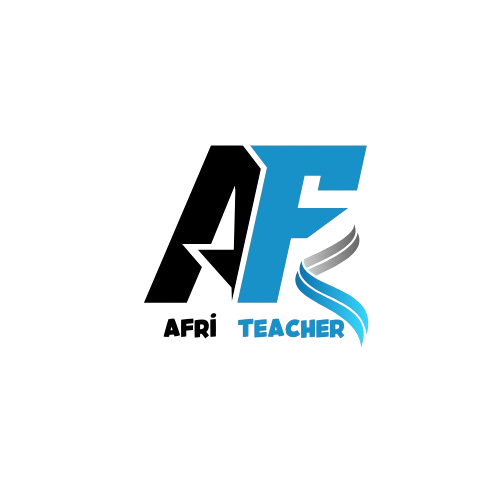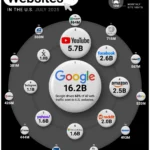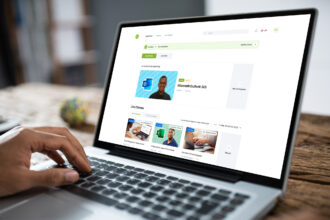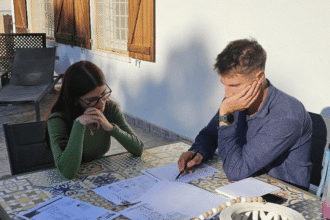The world of academia is no longer confined to dusty libraries and sprawling campuses. A digital revolution has swept through universities globally, creating a new ecosystem for education. For the modern, ambitious student, this means unprecedented opportunities to craft a truly international academic portfolio. At the heart of this global mobility, especially within Europe, lies the iconic Erasmus+ programme. And the cornerstone of a successful Erasmus exchange? A meticulously planned and digitally streamlined Online Learning Agreement (OLA).
Gone are the days of frantic paperwork, lost forms, and bureaucratic delays. The digital shift has brought the entire process to your fingertips. But with great power comes great responsibility. Navigating the OLA platform effectively is the single most critical step in ensuring your semester or year abroad is not just an adventure, but a resounding academic success. This definitive guide is your digital compass, designed to walk you through every step, highlight potential pitfalls, and unlock the full potential of your international study experience.
Understanding the Digital Backbone: What Exactly is the Online Learning Agreement?

Before we dive into the tactical navigation of the platform, let’s establish a foundational understanding. The Online Learning Agreement is the official, digital contract that binds you, your home university, and your host university. It’s a tripartite pledge that outlines the academic component of your exchange.
This document meticulously details the courses you pledge to undertake at your host institution, confirming that the credits you earn there will be fully recognized and transferred back to your degree programme at home. In essence, it’s your academic blueprint for mobility. The transition from a paper-based system to a unified online learning platform like the European Commission’s initiative has been a game-changer, promoting efficiency, transparency, and accountability for all parties involved.
The core components of every OLA include:
- Your Personal & Institutional Details: Identifying you, your home faculty, and your host department.
- The Table of Proposed Studies: The heart of the agreement, listing course titles, codes, semesters, and the number of ECTS (European Credit Transfer and Accumulation System) credits each course carries.
- The Commitment Signatures: Digital sign-offs from you, your home institution coordinator, and the host institution coordinator.
Securing these digital signatures is the ultimate goal, transforming your proposed study plan into a binding academic contract.
Phase 1: The Pre-Departure Digital Sprint – Preparation is Everything
Success in the OLA process is 90% preparation. Rushing this stage is the most common mistake students make. Before you even log in to the portal, your homework must be done.
1. Deep-Dive into Your Host University’s Course Catalogue
Your host university’s website is your new best friend. Spend significant time exploring their course offerings for the specific semester you will be attending. Pay close attention to:
- Course Level: Are they undergraduate or postgraduate level?
- Language of Instruction: Is your fluency sufficient? Many universities offer language learning online resources to help you prepare.
- Timetabling: Ensure there are no major clashes in your proposed schedule.
- Pre-requisites: Some courses may require foundational knowledge you are expected to have.
Pro Tip: Always have a list of 2-3 backup courses. Timetables change, courses get cancelled, or they might be full. A prepared student is a stress-free student.
2. Initiate the Crucial Dialogue with Your Home Coordinator
Your home university’s Erasmus or International Office coordinator is your guide and gatekeeper. Schedule a meeting with them early. Discuss:
- Degree Requirements: Which credits do you still need to fulfill? Can these be met abroad?
- Course Equivalency: What courses at the host university are pre-approved as equivalents for your mandatory modules back home?
- Credit Limits: Understand the minimum and maximum number of ECTS credits you are allowed to take.
This conversation is invaluable. It aligns your ambitions with the academic regulations of your degree, preventing heartbreaking credit rejection later.
3. Leverage Digital Tools for Academic Alignment
This is where you can get strategic. If you’re studying a technical field like data science, and you see a gap in your knowledge, consider using free online courses from platforms like Coursera or edX to brush up on fundamentals before you go. For instance, a quick module on learning Python could be the key to unlocking a fascinating AI course at your host university. The world of online education learning is vast; use it to fortify your position.
Phase 2: The Navigation – A Step-by-Step Walkthrough of the OLA Platform
While the exact interface may vary slightly depending on the specific online learning system your universities use (like Mobility Online), the general workflow remains consistent.
Step 1: Access and Authentication
You will typically receive a link and login credentials from your home university. This often integrates with existing university portals. Ensure you are using a stable internet connection and a recommended browser (usually Chrome or Firefox).
Step 2: Filling in Your Personal Proposal
This is the straightforward part. You’ll enter your personal data and select your home and host institutions from dropdown menus. The system should pre-populate much of this. Double-check for accuracy.
Step 3: The Core – Adding Your Proposed Courses
This is where you build your study plan. You will be presented with a table to fill out. For each course, you will need:
- Host Course Code & Title: Be exact. Copy this directly from the host university’s official course catalogue.
- Component Type: (e.g., Lecture, Seminar, Project).
- Semester: (e.g., Autumn, Spring).
- Number of ECTS Credits.
Live Daily Information Tip (As of October 2023): Many universities are now embedding direct links to their course catalogues within the OLA platform. Look for a “Search Courses” button that might allow you to browse and select courses without switching tabs, making the process more seamless than ever.
Step 4: Writing a Compelling Learning Agreement Justification
Don’t leave this box blank! This is your chance to articulate the academic rationale behind your choices. Write a concise paragraph explaining:
- How these specific courses align with your degree program back home.
- The unique academic value the host institution provides (e.g., “I have selected Professor X’s course on Renewable Energy Policy due to her renowned research in the field, which complements my final year project on sustainable development.”).
- How this selection contributes to your overall learning objectives.
A well-justified OLA shows the coordinators you are a serious, strategic student and can expedite the approval process.
Step 5: Submission and the Digital Approval Chain
Once you hit “Submit,” the digital workflow begins. The OLA is first routed to your home coordinator for approval. They will check for academic fit and degree relevance. Once they sign digitally, it moves to the host university. Their coordinator verifies that your selected courses are available, you meet any prerequisites, and there are no scheduling conflicts.
You will receive email notifications at each stage. The transparency of this online learning platform is one of its greatest strengths.
Phase 3: Overcoming Common Digital Hurdles and Changes
Even the best-laid plans can change. The OLA platform accounts for this through “During the Mobility” modifications.
Scenario: A Course is Cancelled or Full.
Don’t panic! This is common.
- Immediately research a suitable replacement from your backup list.
- Contact your host coordinator to confirm the new course’s availability.
- Log back into the OLA platform. There will be an option to “Request Change” or “Modify.”
- Add the new course and remove the old one.
- Write a brief justification for the change (e.g., “Course X was cancelled by the host department. Course Y is a suitable replacement as it covers similar thematic content.”).
- Re-submit. The change request will go through the same digital approval chain.
The key is communication. Inform both your home and host coordinators via email while you initiate the digital change request.
The Bigger Picture: Leveraging Your Erasmus for Future Success
Your Erasmus experience is more than just credits. It’s a holistic development opportunity. The skills you gain from navigating a foreign university system, adapting to new teaching styles, and managing your academic life in a different culture are invaluable to future employers.
Complement Your Formal Studies with Informal Learning:
- Language Immersion: While you’re there, go beyond the classroom. Use learning english online platforms if you’re in an English-speaking country, or dive into learning spanish online if you’re in Spain. Practice is irreplaceable.
- Professional Development: Platforms like LinkedIn Learning offer fantastic short courses on everything from project management to digital marketing. Completing a relevant course during your exchange looks fantastic on your CV.
- Explore Niche Fields: Your host university might offer courses in areas not available at home. This is your chance to explore niche interests, much like you would with ai courses online free to test the waters before committing.
A Comparative Look: Online Learning Platforms for Lifelong Education
The OLA platform is a specialized tool for academic mobility. However, the confidence you gain from mastering it can be applied to the vast universe of online learning platforms available today. Understanding this ecosystem is a powerful skill.
| Platform | Best For | Cost Model | Key Feature |
|---|---|---|---|
| Coursera | University-level degrees & professional certificates | Freemium | Partnerships with top-tier universities |
| edX | Similar to Coursera, strong in STEM | Freemium | Founded by Harvard and MIT |
| LinkedIn Learning | Business, Creative & Tech soft skills | Subscription | Direct integration with LinkedIn profile |
| Udemy | Wide variety of practical, skill-based courses | Per Course | Huge library, frequent sales |
| Alison | Free online learning for core skills & diplomas | Free (Paid Cert.) | One of the pioneers in free certification |
| Codecademy | Interactive coding practice | Freemium | Hands-on coding environment in-browser |
Whether you’re pursuing online courses Australia offers or exploring cpa online learning for professional accounting qualifications, the principle remains the same: a clear learning goal, diligent research, and proactive management of your progress are the keys to success. The benefits of online learning—flexibility, accessibility, and a global perspective—are the very same benefits you are harnessing through your Erasmus exchange.
Conclusion: Your Digital Gateway to a Transformative Experience
The Online Learning Agreement for Erasmus is far more than a bureaucratic hurdle. It is the first, and most important, academic project of your exchange. By approaching it with strategic preparation, meticulous attention to detail, and a proactive mindset, you lay the foundation for an unforgettable and transformative chapter of your life.
You are not just a student filling out a digital form; you are an academic architect, designing your own international curriculum. You are leveraging digital tools to build your future. Embrace the process, master the platform, and then step out into your new host city, secure in the knowledge that your academic journey is firmly on track. The world of online education learning has empowered you to take control. Now, go and make the most of it.












